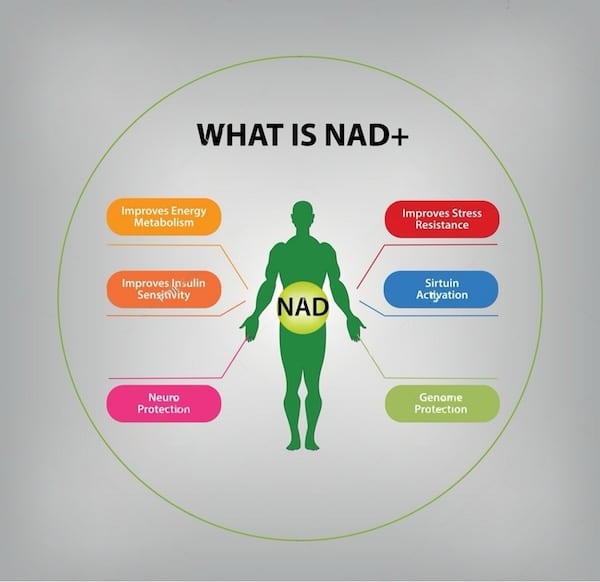Understanding NAD+ and Its Role in Your Health
Did you know that NAD+ levels drop as you age? This decline in NAD+ (nicotinamide adenine dinucleotide) is a key factor in why we experience decreased energy, weakened immune function, and a higher risk of chronic diseases as we age.
NAD+ is a critical molecule found in every cell of the human body, essential for energy production, DNA repair, and maintaining healthy cellular functions.
As a professional athlete with a background in nutrition education, I understand the importance of optimizing health at every level. While I haven’t personally experimented with NAD+ monitoring or supplementation, the science behind it is compelling.
It suggests that maintaining healthy NAD+ levels could be a vital part of promoting overall well-being, particularly as we age.
Whether through diet, supplements, or lifestyle practices, there are ways to support your body’s NAD+ levels. However, it’s important to approach these methods thoughtfully and safely.
While for some, testing and optimizing NAD+ might be an interesting avenue to explore, for most, maintaining a healthy lifestyle may be the best approach to support NAD+ levels naturally.
What is NAD+?
NAD+ is involved in numerous cellular processes, including converting nutrients into energy and supporting the repair of damaged DNA. It is also vital for regulating various processes that help keep the body functioning optimally.
When NAD+ levels are sufficient, cells can operate efficiently, but as levels drop, these functions can become impaired, potentially leading to health issues.
How to Increase NAD+ Levels
Researchers have explored various methods to boost NAD+ levels, including lifestyle changes and supplementation, to address the decline in NAD+ levels that comes with aging.
Supplements
Some supplements contain NAD+ precursors like Nicotinamide Riboside (NR) or Nicotinamide Mononucleotide (NMN).
These compounds can be converted into NAD+ in the body, potentially helping to restore NAD+ levels.
The optimal daily dosage of Nicotinamide Mononucleotide (NMN) for boosting NAD+ levels is still under research, and recommendations can vary based on individual factors such as age, health status, and specific health goals.
However, most human studies have used NMN dosages ranging from 250 mg to 500 mg per day. Some studies have gone as high as 1,000 mg per day. It’s generally advised to start with a lower dose and gradually increase it if needed, while monitoring how your body responds.
As always, it’s important to consult with a healthcare professional before starting NMN supplementation, especially if you have any pre-existing health conditions or are taking other medications.
Dietary Choices
Certain foods contain nutrients that can help support NAD+ production in the body, primarily through their content of B vitamins, particularly vitamin B3 (niacin), and other compounds that contribute to cellular energy metabolism.
Here are some foods that may help boost NAD+ levels:
- Dairy Milk: Rich in riboside nicotinamide, a precursor to NAD+.
- Fish: Fatty fish like tuna, salmon, and sardines are good sources of vitamin B3 (niacin), which is involved in NAD+ production.
- Mushrooms: Particularly cremini and portobello mushrooms, which contain B vitamins, including niacin.
- Yeast: Brewer’s yeast and nutritional yeast are high in niacin and other B vitamins.
- Whole Grains: Foods like brown rice, barley, and whole wheat contain niacin.
- Green Vegetables: Vegetables such as peas, asparagus, and broccoli are good sources of B vitamins.
- Chicken and Turkey: These are also good sources of niacin.
- Avocado: Contains niacin and other beneficial nutrients.
While these foods can contribute to maintaining healthy NAD+ levels, their impact is generally less pronounced compared to direct supplementation with NAD+ precursors like Nicotinamide Riboside (NR) or Nicotinamide Mononucleotide (NMN).
Incorporating these foods into a balanced diet can support overall health and NAD+ metabolism.
Lifestyle Practices
Certain lifestyle practices can naturally enhance NAD+ levels by stimulating the body’s production pathways:
- Fasting: Intermittent fasting triggers metabolic changes, including increased NAD+ production. The body enhances energy efficiency during fasting by boosting NAD+ levels, particularly through processes like autophagy.
- Exercise: Regular physical activity, both aerobic and resistance training, promotes NAD+ production by activating sirtuins, enzymes essential for cellular health. Exercise increases the demand for NAD+, supporting higher levels in the body.
- Caloric Restriction: Reducing daily calorie intake without malnutrition can boost NAD+ levels by mimicking fasting effects. This practice has been linked to longevity and improved cellular energy balance.
- Heat Exposure: Regular sauna use can stimulate NAD+ production through the activation of heat shock proteins, which protect against cellular damage and support overall health.
Safety and Considerations
Raising NAD+ levels, whether through supplements or lifestyle changes, should be approached with care. It’s important to start with low doses when trying new supplements and to pay attention to how your body responds.
Consulting with a healthcare provider is also recommended, especially if you are taking other medications, as interactions may occur.
While NAD+ supplements are generally considered safe in the short term, the long-term effects are still being studied. It’s essential to stay informed and make decisions based on the latest available research.
Final Thoughts – Should You Monitor NAD+?
NAD+ is a vital molecule that supports many essential functions in the body, particularly as we age. While maintaining healthy NAD+ levels can be important, whether testing for NAD+ is worthwhile depends on your individual health goals.
For most people, focusing on a healthy lifestyle may be sufficient, but if you have specific health concerns or a strong interest in optimizing your health, it could be something to explore.
Although I haven’t personally tried to boost or monitor my NAD+ levels, the science shows promising benefits. It’s an area that holds interesting potential for the future, and it’s something I may consider experimenting with down the line.
This website does not provide medical advice. This website site does contain affiliate links, and purchases may earn a commission.
Read my Medical Disclaimer, Review Disclaimer, and Publishing Policies for more details. Use of this site indicates acceptance of these terms.



